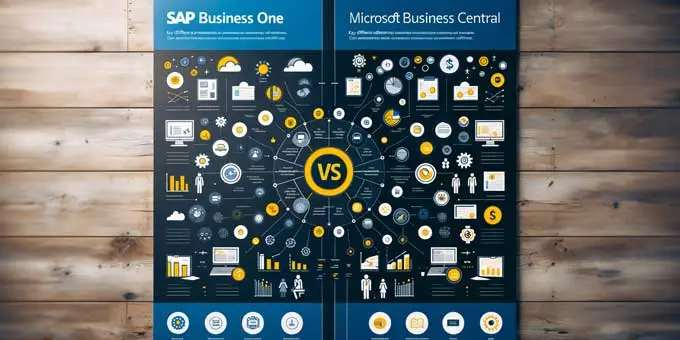In the ever-evolving business landscape, the selection of an Enterprise Resource Planning (ERP) system has become a crucial step for companies. Two primary players often under consideration are SAP Business One and Microsoft Business Central. Both platforms promise operational efficiency, increased productivity, and enhanced visibility across the entire business value chain.
The Importance of Choosing the Right ERP
Choosing between SAP Business One and Microsoft Business Central requires companies to consider their unique needs. This decision not only impacts day-to-day operations but also influences the ability to adapt to future changes.
In this article, we will explore various aspects covering core features, integration, scalability, data security, and implementation costs of both platforms. This in-depth comparison aims to provide readers with a holistic view, assisting them in making informed decisions tailored to their specific business needs.
Now, let’s delve deeper into SAP Business One and Microsoft Business Central.
Feature Comparison
SAP Business One: Financial Management
SAP Business One remains an excellent choice for holistic financial management. With features like transaction tracking, budget monitoring, and real-time financial reporting, SAP Business One provides essential capabilities for efficiently managing the financial aspects of a company.
Microsoft Business Central: Finance and Accounting
On the other hand, Microsoft Business Central excels in finance and accounting with a focus on purchasing, financial reporting, and seamless integration. This provides an attractive alternative, especially for companies centered around the Microsoft ecosystem.
SAP Business One: On-Premise Data Storage
SAP Business One offers the flexibility of on-premise data storage, giving companies full control over the security and physical location of their data. This can be a critical choice for organizations with strict security policies or specific regulatory requirements.
Microsoft Business Central: Cloud Data Storage
Conversely, Microsoft Business Central offers a cloud-based data storage solution. This provides the advantage of accessing data from anywhere and minimizes the need for physical infrastructure. Cloud presence also optimizes scalability and system maintenance.
Advantages of Integration and Compatibility
SAP Business One: Integration with Third-Party Applications
SAP Business One maintains its strong integration capabilities with third-party applications, creating a connected ecosystem to support all business needs. With solid integration, companies can leverage additional functionalities from various solutions without excessive technical challenges.
Microsoft Business Central: Compatibility with Existing Systems and Integration with Microsoft Office
Microsoft Business Central has won the hearts of many companies with its high compatibility with existing systems. However, its appeal doesn’t stop there. This solution offers seamless integration with Microsoft Office, facilitating collaboration and data exchange across platforms.
With integration into Microsoft Office, companies can stream information to and from applications like Excel, Word, and Outlook directly. For example, financial data from Microsoft Business Central can easily be exported to an Excel spreadsheet for further analysis or embedded in an email through Outlook for sharing with teams or clients.
Scalability and Flexibility
SAP Business One: Scalability Capability
The scalability capability of SAP Business One remains one of its main advantages. Companies can adjust system capacity according to their business growth without feeling restricted.
Microsoft Business Central: Flexibility in Adaptation
Microsoft Business Central provides a high level of flexibility in adapting systems to changing business needs. This ability is crucial in facing market changes and customer demands.
Data Security and Compliance
SAP Business One: Highest Data Security
SAP Business One is renowned for its high-security standards applied to data storage and management. With robust data encryption, strict access controls, and real-time security monitoring, companies can feel confident that their sensitive information is protected.
Microsoft Business Central: Compliance and Data Protection
Microsoft Business Central also emphasizes its commitment to data security and compliance. The system complies with various industry regulations and offers robust data protection through advanced security technology.
Implementation Costs and Total Cost of Ownership (TCO)
SAP Business One Implementation Costs
The implementation costs of SAP Business One remain a critical consideration. While this investment can vary, many companies see it as a valuable step considering its long-term benefits.
TCO Analysis for Microsoft Business Central
Microsoft Business Central often offers a more flexible cost model, allowing companies to control the Total Cost of Ownership (TCO) according to their business scale. With this flexibility, companies can manage their budgets more effectively.
User Reviews and Expert Recommendations
User Experience with SAP Business One
Users consistently praise the stability and reliability of SAP Business One. Positive experiences often become a key factor in recommendations to other companies.
Expert Recommendations: SAP Business One vs. Microsoft Business Central
Experts highlight the strengths of each solution and suggest that companies consider specific business needs as well as security and compliance factors when choosing between SAP Business One and Microsoft Business Central.
SAP Business One or Microsoft Business Central: Final Conclusion
This comparison has detailed the differences between SAP Business One and Microsoft Business Central from various aspects. The choice depends on business needs, technological preferences, and the company’s vision for future growth.
In determining the most suitable solution, consider factors such as business scale, functional requirements, data security, and data storage preferences.
Whether you prefer the on-premise data storage flexibility of SAP Business One or the convenience and data accessibility in the cloud through Microsoft Business Central, choose according to your business challenges and goals.
If you are still unsure or want a deeper insight, feel free to contact us at PT Sterling Tulus Cemerlang. We are ready to help you find the ERP solution that best fits your unique business needs. Gain an advantage with us in designing a successful future for your business!



